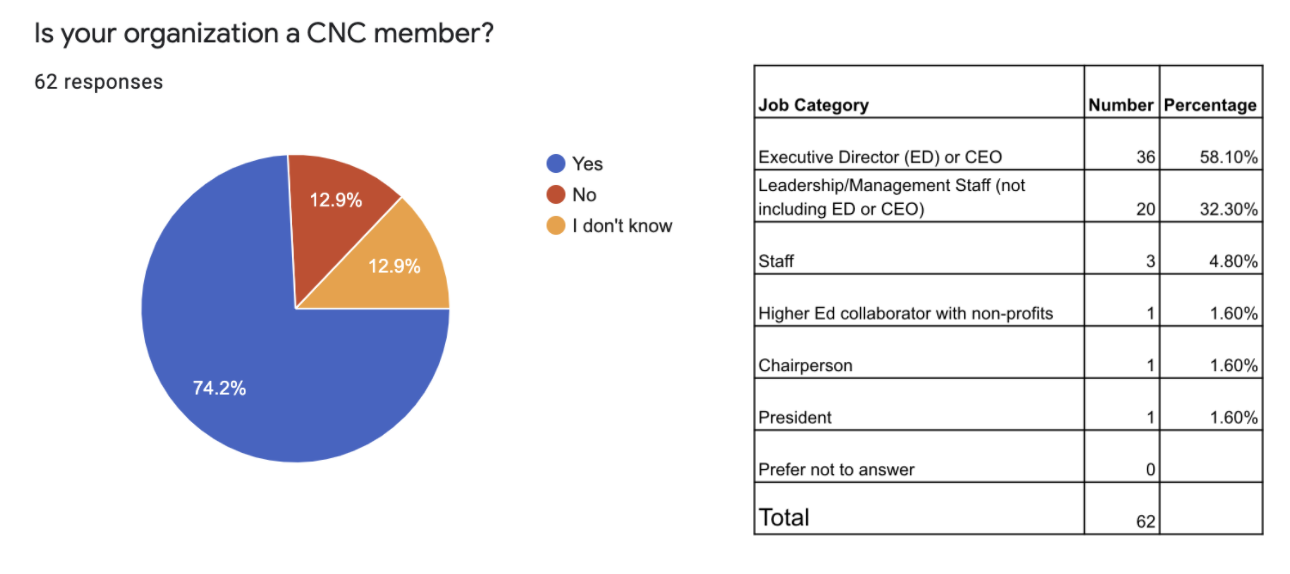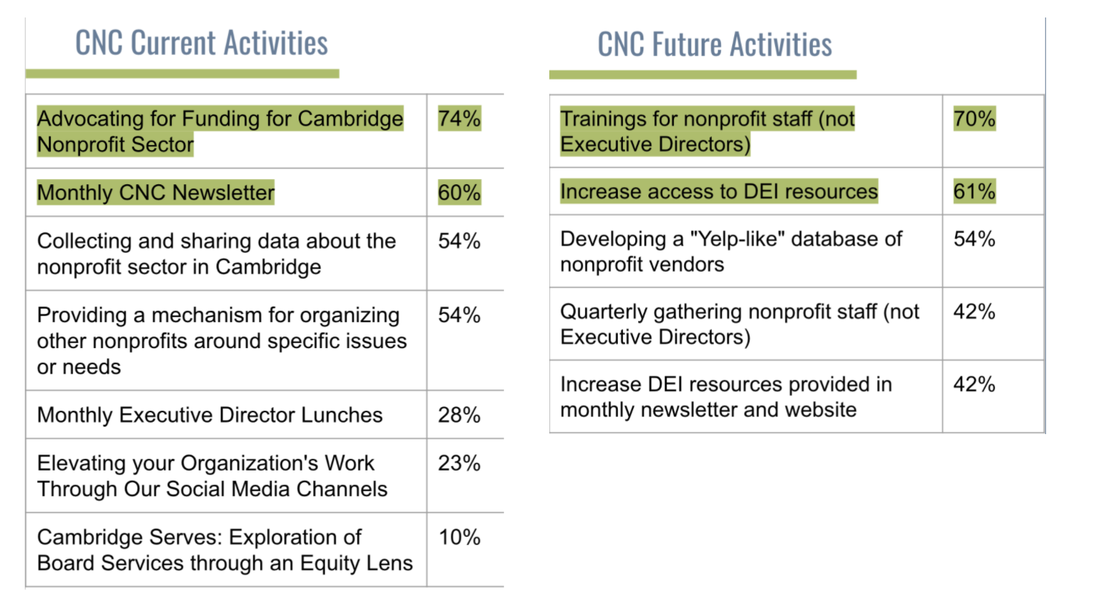|
“Just having trouble focusing on surveys right now-sorry! Too much to do.” — bracingly honest 2021 survey respondent Survey overload is a little-known, but very real pandemic side-effect. That’s why CNC held back on our annual feedback survey during the height of the crisis. Nevertheless, by June 2021, we knew it was time to take the Cambridge nonprofit sector’s temperature. “CNC has grown tremendously the last few years. I hope that as we grow and formalize we can maintain the grassroots vibe and stay nimble. Always a tricky balance.” — wise 2021 respondent on a big upcoming CNC challenge In this article, we’ll look at the big trends from the survey data and comments, and how CNC will address respondents’ suggestions, hopes, and concerns:
Survey questions: We reached out for two broad purposes. First, to evaluate how we’re pursuing our mission. Second, to evaluate what resources and services are most valuable; and which would be most valuable to add. Survey Respondents: Over 60 Cambridge nonprofits responded. We purposefully sent it beyond our membership, as CNC’s mission is to strengthen the entire Cambridge nonprofit sector. Almost 75% were members (13% were not members; 13% weren’t sure). The majority of our respondents are deeply knowledgeable about their organizations’ needs: over 50% were EDs, and another 30% were management-level staff. 1. Evaluating CNC’s mission:
Our mission breaks down into 4 discrete parts:
We asked respondents to rate us on each prong on a scale of 1 (strongly disagree) to 5 (strongly agree). The numbers below reflect the sum of “4”s and “5”s on that scale: 2. Evaluating CNC’s services & resources
We asked: Which of our current activities or resources has been the most helpful to your organization? We allowed respondents to select all that applied. We also asked the same question for “potential future services.” Here are how the options ranked: 3. What CNC has done well
Our high marks for strengthening the sector (94%) and promoting collaboration (91%) come into relief when looking at some answers to our question: It's important to celebrate our collective wins! Please share an example. Overall, these high marks reflect the role we stepped into during the crisis. A few big trends in our response stand out. (In all quotes, bolding added for emphasis.) But first, here’s one quote that perhaps best encapsulates what CNC (and the sector) were able to do in the last year and a half: “[T]hat most(?) or all of us are still standing after 14+ months of COVID is a big win and CNC certainly had a part in helping us through the resources, etc. over the last year.” [Note: While many Cambridge nonprofits had to temporarily close, none that we know of closed permanently, which is indeed a huge win for our community.] Big trend #1: Covid relief grants. Perhaps unsurprisingly, respondents were most excited about CNC’s role in advocating for two rounds of Covid relief grants from the City of Cambridge Community Benefits Fund, each at just over $1 million ($10k for just over 100 nonprofits each time), and urging a simple application and equitable distribution of funds. “Advocacy for the two rounds of emergency COVID funding from the City of Cambridge was extremely helpful and unexpected. The process was straightforward and easy for a small nonprofit like ours.” “CNC advocated for equitable funding to Cambridge non-profits representing all walks of life. This has helped us during COVID emergency period.” “CNC advocacy that resulted in the city administering two rounds of emergency grant funding for nonprofits was pivotal. I hope we can continue down this path in terms of the relationship between the city and the nonprofits that serve Cambridge residents.” Big trend #2: Filling service gaps (digital equity + sanitary stations). The second big trend was bringing professionals together to strategize how to meet emergency needs that would otherwise have fallen through the cracks. The big ones were (1) raising City awareness of major deficits in digital equity, even as everyday services went online en masse, and (2) launching the Unhoused Advocacy subcommittee, which successfully advocated for more public toilets and handwashing stations. Note that many nonprofits that aren’t focused on the unhoused joined in to help advocate for these hygiene measures. Digital equity - quotes. While these 3 quotes are extremely similar, they come from different survey respondents, we promise: “Digital Divide group; providing critical insight on places where Municipal emergency response was not reaching people (early Pandemic)” “CNC was a primary and leading source in raising up the Digital Inequity for many segments of the community in the City's initial emergency responses to the Pandemic[.]” “During [the f]irst part of COVID ... bringing authentic voices around highlighting emergency messages [that] were not reaching folks for lack on Internet access.” Sanitary stations for the unhoused - quotes: “CNC offered the space and time for unhoused providers to come together and collaborate on issues that directly impact our community and build collective power.” “[S]upporting the unhoused community through COVID -- fighting for showers, shelter, and more” “I had the pleasure of being a part of the conversations and collaboration around efforts for providing housing and bathrooms/washing stations for unhoused residents, along with GBIO (Greater Boston Interfaith Organization) and other pastors/churches and with CNC. I so appreciated the collaboration and the impact we were able to make.” Big trend #3: Community, collaboration (and ED lunches) during a crisis. Finally, many respondents mentioned most appreciating the peer support that CNC made possible “Throughout COVID it's been great to have the connectedness and resources of the ED lunches [...]” “I feel closer to my peers because of your Zoom calls during the pandemic than I have ever done so before. I loved how you provided a place for us to convene with free form to discuss the challenges/ issues (not all stressful - loved the ideas for celebrations) we have - and the meditation, discussion of objects in our office. You all at CNC have done a tremendous job at bringing us together and strengthening the nonprofit community during this time. This is the best way to promote equity and justice, the mission of all of our work - we can't do this work if our organizations are stressed and/or fraying.” “[R]aising up the dramatic programmatic shifts that many NP's had to make in the Pandemic ( for example, changing rapidly from a fee-for-service afterschool or arts program, to become a distribution center of emergency food and providing guidance for accessing emergency relief, common concerns of survival were shared among NP's ( for example laying off almost all staff, in order for the organization to survive long enough to hire back ); knowing the strategies others were using to survive and learn was a critical support for many leaders[.]” 4. Where CNC might improve and expand
We performed somewhat less well when it comes to the mission areas of building nonprofits’ collective voice (85%) and working to advance equity and justice (76%). Similarly, our ranking of services/resources shows that some are less popular than others (or feel more necessary to add). Again, some insight comes from looking at responses to the questions:
Big trend #1: Building collective voice. While nobody offered concrete ideas on this strand of our mission, it’s clear that many respondents are unhappy with the sector’s ability to assert itself in the political landscape. In quoting praise for the Covid grants above, we mentioned one respondent who said, “I hope we can continue down this path in terms of the relationship between the city and the nonprofits that serve Cambridge residents.” Others clearly shared this anxiety/hope: “[W]hat would this city be without its non-profits?....somehow the framing currently in our country places non-profits as charity only vs. great services available to all. Valuation: raising our stock as valued parts of the ecology of business, of service, of daily living.” “Keep catalyzing and measuring what matters to Non profits to be able to speak with authority.” “More promotion of the work being done” “Working with other coalitions of Nonprofits for example ([Mass Nonprofit Network]) and planning and policy makers ... who are the progressive legal and policy experts to chart advocacy” Big trend #2: Advancing equity & justice/increasing DEI. We received one (and only one) negative review on these related subjects: “I think that CNC has a lot of work to do in terms of internal DEI work before it will be taken seriously as a voice for equity and justice in the community.” Unfortunately, this respondent didn’t elaborate. However, other answers provide some specifics that may prove useful as CNC works to improve on the vital fourth prong of our mission (advancing equity and justice), as well as on amplifying our DEI values. In particular, two respondents advocated for helping to bring together religious institutions; and one wanted a more explicit focus on the immigrant experience. “The CNC's influence could vastly expand by using its current well-earned admin structure and increased social stature to launch a membership outreach initiative aimed at faith based organizations. The aim: to create an interfaith 'arm' of the CNC among faith-based organizations.” “[M]aybe networking and creating collaborati[ons] among alike industries, for example, we're a church, a network of other churches?” “CNC should advocate more activities to address immigrant experience in Cambridge, in order to promote [a] better way of life, advancement for learning & career opportunities.” Finally, a few respondents said they looked to CNC to provide DEI training in particular — as we have begun to do, for example with our Cambridge Serves events in January 2021 (with Cambridge Volunteer Clearinghouse). One quote succinctly summarizes these views: “Help us with DEI!" Big trend #3: More networking, especially at the staff level. Networking came up frequently as something respondents wanted more of. (A few simply said, “Networking,” which is why there aren’t more quotes below.) But they often mentioned expanding our circle beyond Executive Directors: “As a new staff member to Cambridge, I can benefit from networking, get to know Cambridge's political landscape.” “networking - virtual and later in person, esp. for non ED level staff (the more on-the-ground day-to-day staff program implementers)” Big trend #4: Bringing business into the fold. Many respondents wanted help making valuable connections within the business community. “[I]ntroductions or networking opportunities with area businesses and institutions - for long-term relationship-building for board members, volunteers (team-building activities for their staff), sponsors (brand- and community-building for area business and institutions), donors, etc.” “[I]ntroducing our work to area businesses that might be future funders” Big trend #5: Administrative support. A few of the answers above have an administrative quality to them (providing sector-wide DEI training, facilitating business sector introductions). But many respondents see value in developing our offerings on this scale “Together with developing a ‘Yelp-like’ database of nonprofit vendors, developing a portal or contact point where all necessary help and information as a one-stop shopping would be great.” “Possibly some shared services (like bookkeeping), shared office space, and/or collective purchasing of supplies. Definitely shared training opportunities (i.e., bring in a trainer on topics of interest to staff, board, leadership), and hosting discussions with funders and organizations would be good too.” “Professional development for all levels of staff” 5. CNC responds: some of our tangible next steps
These survey results will strongly inform our planning and strategy sessions which will be happening with many coalition members over the course of the next year. In that sense, it’s too soon to say how these responses will influence what CNC does next. Nevertheless, some of our next steps directly address hopes and concerns raised here. Next step #1: clarifying some coalition basics. We were sad to see a few comments that showed us we haven’t been clear enough on some of our offerings: “Include more nonprofits — lower fees.” “I'd appreciate more information about how to access CNC's support with social media and marketing efforts. I'd like to access this support and do not know how." Immediately after seeing these results, we added a permanent box in our newsletter clarifying that:
We will continue looking for ways to be clear about these resources and others that are available to all Cambridge-serving nonprofits. Next step #2: internal DEI work. We’ve already formed a new DEI advisory committee, which designed a CNC Demographics and Organizational Assessment Survey. We sent it out to our member organization’s primary contacts, subcommittee members and chairs, as well as CNC staff. (The deadline is October 1). This data will serve as an important baseline. Next, we’ll be hiring a consultant to help us interpret results, identify informational gaps, and develop an action plan. We’re extremely excited about this effort, which is a high priority for the entire coalition. Next step #3: offering more trainings for Cambridge nonprofit staff. In April, we piloted an intensive, 3-part training on leadership for young professionals with Jessye Kass. In light of that program’s success, we were able to budget to bring Jessye back for additional training sessions in November. In addition, with the support of CNC’s social work fellows, we’re researching other ways to provide professional development opportunities. Next step #4: advocacy around ARPA Fiscal Recovery funds and continued engagement with City of Cambridge Community Benefits. Last but certainly not least, CNC is focused on building nonprofit sector influence on City of Cambridge decision-making about financial resources for nonprofits and the communities they work with. In particular, we are in frequent conversation with our allies about ARPA direct aid to Cambridge ($65M+), how to ensure that we get broad, authentic community input on how to spend those funds from the people most affected by the crisis, and how to address challenges created by Massachusetts’ Anti-Aid amendment. We’re also deeply engaged with the Community Benefits Fund — we’re collecting feedback from Cambridge nonprofits on previous grant processes and advocating for greater transparency of evaluation data, in service of improving the funding model and its impact. Most importantly, CNC will continue advocating for funding to nonprofits doing all kinds of work — in the words of one respondent, “support[ing] the sector as a whole ... rather than creating a funding environment that has us competing with each other” — as well as ensuring that the application process is as easy and unburdensome as possible. Comments are closed.
|
|
Contact Us
Cambridge Nonprofit Coalition
C/O Mission Earth
1257 Worcester Road, #312
Framingham, MA 01701
Elena Sokolow-Kaufman
Executive Director
[email protected], 617-401-7948
Cambridge Nonprofit Coalition
C/O Mission Earth
1257 Worcester Road, #312
Framingham, MA 01701
Elena Sokolow-Kaufman
Executive Director
[email protected], 617-401-7948




 RSS Feed
RSS Feed